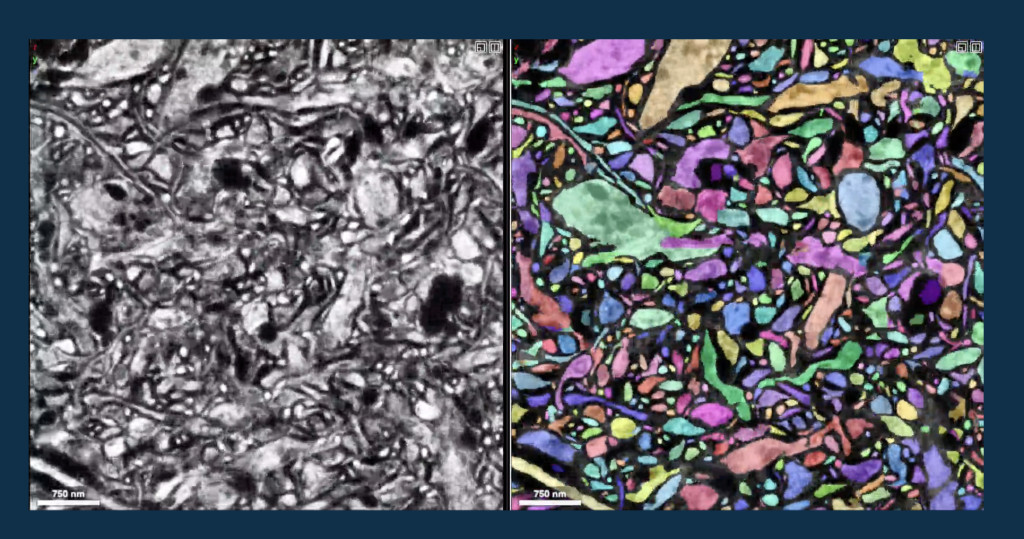

The detailed study of the fly connectome has revolutionized neuroscience, offering insights into brain circuitry and its applications. Extending this progress to the mouse brain, which shares more structural similarities with the human brain, holds immense potential. It could provide the foundation for brain-inspired AI systems, enabling human-like capabilities such as continual learning, energy efficiency, and improved safety. Additionally, it may pave the way for breakthroughs in treating brain disorders by identifying abnormal connectivity patterns, testing therapies, and advancing brain-computer interfaces. On a broader scale, understanding mouse brain circuitry could illuminate how individual experiences are stored, guiding efforts to simulate human-like creativity and curiosity in AI responsibly.
However, scaling connectomics to map the larger mouse brain is a formidable challenge. With current electron microscopy techniques, reconstructing a single mouse connectome could exceed the cost of the Human Genome Project, primarily due to the labor-intensive proofreading step, which accounts for over 95% of project expenses. This process manually corrects AI-generated segmentations, making it a critical bottleneck in scaling mammalian brain studies. To make mouse brain connectomics routine and cost-effective, reducing the reliance on human proofreading is essential, ensuring the feasibility of mapping diverse brain states and disorders for transformative scientific and medical advancements.
Researchers from E11 Bio, alongside collaborators from institutions like the Crick Institute and MIT, have introduced PRISM (Photo-connectomic Reconstruction by Iterative Staining with Molecular annotations), a groundbreaking platform to make brain connectomics significantly faster, cheaper, and scalable. PRISM assigns unique protein barcodes to cells, enabling self-proofreading AI segmentation to drastically reduce human intervention, addressing over 95% of current costs. Leveraging light-sheet microscopy and expansion techniques, PRISM achieves electron microscopy-level resolution at a fraction of the cost, while GPU-efficient segmentation methods further cut expenses. These innovations collectively promise a 100-fold reduction in whole-brain mapping costs, paving the way for scalable neuroscience research and applications.
E11 Bio’s PRISM platform integrates genetic protein barcoding, expansion microscopy, and self-proofreading AI segmentation to revolutionize brain connectomics. Protein barcoding assigns unique molecular identifiers to neurons, enabling high-resolution discrimination of individual cells. Expansion microscopy offers nanoscale imaging using light microscopy, reducing reliance on costly electron microscopy. Advanced AI models leverage multi-channel data for automated, accurate image segmentation, minimizing the need for manual proofreading. PRISM aims to scale connectomics for entire mammalian brains within five years, with plans to improve imaging, segmentation, and real-time data processing while collaborating with global partners to advance hardware, software, and applications for neuroscience and AI.
PRISM, developed by E11 Bio, enables the capture of molecular annotations through multi-cycle imaging, allowing for a deeper understanding of brain connectivity. Linking transcriptomic cell types to connectomes creates “Rosetta Stone†datasets bridging modalities like optical and electron microscopy. This integration enhances simulations of brain networks and can support advances in cell and connectomic atlases. Combining PRISM with RNA profiling and RNA-based mapping methods holds significant promise for understanding complex brain functions, offering vast potential for neuroscience and AI applications.
E11 Bio’s fast-paced R&D program, backed by an expert interdisciplinary team, has made notable advancements in neuronal wiring imaging, AI-based image segmentation, and CRISPR barcoding techniques. Their work on expansion microscopy has dramatically improved optical resolution, enabling detailed brain mapping at the nanoscale. As a non-profit organization with an open science philosophy, E11 Bio is committed to making its groundbreaking technology accessible to researchers globally, aiming to scale connectomics from smaller brains to larger, more complex ones like humans. This approach is pivotal for advancements in brain-inspired AI and treating brain disorders.
Check out the Details here. All credit for this research goes to the researchers of this project. Also, don’t forget to follow us on Twitter and join our Telegram Channel and LinkedIn Group. If you like our work, you will love our newsletter.. Don’t Forget to join our 60k+ ML SubReddit.
 [Must Attend Webinar]: ‘Transform proofs-of-concept into production-ready AI applications and agents’ (Promoted)
[Must Attend Webinar]: ‘Transform proofs-of-concept into production-ready AI applications and agents’ (Promoted)
The post E11 Bio Introduces PRISM: Revolutionizing Brain Connectomics for Scalable Neuroscience and AI Applications appeared first on MarkTechPost.
Source: Read MoreÂ



